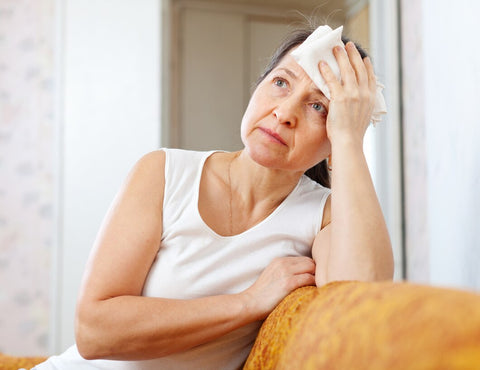There are other lesser-known physical and psychological changes associated with this stage… here we explain them to you!
When we talk about menopause, it is inevitable to wonder how our body changes at that time and what are the symptoms that confirm it . Studies claim that 90% of women in menopause suffer from several of them. According to a study by the Spanish Association for the Study of Menopause and the Spanish Foundation for the Study of Menopause, vaginal dryness is one of the most common symptoms, experienced by 51.7% of the women in the study. Dry skin is another frequent symptom, suffered by 45.5%, followed by lack of sexual desire (43.8) and hot flashes (40.9%). But they are not the only ones that are suffered.
This is how our body changes when we enter menopause
The genetics, constitution, lifestyle and particular conditions of each woman will make her symptoms vary to a greater or lesser extent. The hormonal imbalance prior to menopause will also mean that, when the time comes, the drop in estrogen production will produce more or less imbalances, something that gives rise to many types of symptoms, even those that are not talked about.
This period is characterized by strong endocrinological changes, unpredictable and variable, with a marked clinical impact (in the form of symptoms) that, according to experts, leads patients to frequently go to the doctor's office. All of them surely know the most common symptoms mentioned above, but there are other variables unique to each organism that can influence when experiencing less known symptoms of menopause , but directly related to it. By progressively losing ovarian function, and, therefore, lowering the production of female hormones, estrogen and progesterone, the body can react in different ways.
There are other physical and psychological changes that are much less common and less known that are also associated with menopause and that are worth knowing about.
Rare symptoms of menopause
One of the keys to preparing for possible changes in this cycle is learning to identify these discomforts that are not always related to the hormonal issue and that are often silenced, ignored or even "normalized" without looking for solutions or treatments to alleviate them. At Madequa we explain some of the lesser-known symptoms of menopause:
Memory loss and decreased concentration . Various scientific studies have shown that the reduction in estrogen and progesterone during menopause negatively affects learning, memory and the ability to concentrate, as well as causing so-called brain fog.
Cephalalgia . This refers to recurrent headaches that can range from mild to severe and are characterized by a feeling of heaviness, constriction and pricking.
Vertigo and dizziness . These annoying problems are related to hormonal changes and fluctuations in blood pressure. Avoiding sudden changes in position and practicing relaxation techniques, such as deep breathing, can help alleviate them.
Paresthesia . An abnormal sensation of the senses or general sensitivity, which may consist of a sensation of tingling, numbness, tingling, sponging, prickling, chills, burning, etc.
Heaviness and pain in the breasts . Hormones play a big role here, as hormonal changes can cause women to feel tension, pain or inflammation in their breasts, similar to what is experienced during premenstrual syndrome.
Skin changes and changes in the epithelial barrier related to the alteration of ceramide production and the decrease of estrogens. This causes the weakening of the skin, the reduction of its elasticity due to a lower production of collagen and the deterioration of wound healing.
Some conditions such as atopic dermatitis, psoriasis and acne arise due to changes in the composition of ceramides that occur due to hormonal changes during menopause.
Increased skin sensitivity . Also in relation to the skin, some women may experience increased sensitivity of their skin, a reduction in the cohesion of the outer layer of the epidermis, changes in the epidermal structure and biomechanical function. The consequence is that all of this can lead to itching, tingling sensations or skin that is more sensitive to touch.
Changes in the texture, appearance, volume and quantity of hair . Hair is one of the biggest victims of menopause, as changes in the hormonal levels of estrogen, which are involved in regulating the hair cycle, lead to a reduction in hair in the growth phase, the appearance of finer and more brittle hair, hair loss and, in some cases, frontal fibrosing alopecia - alopecia that usually affects the area of the headband and eyebrows and that tends to form scars, pimples appear and the veins on the forehead become more prominent.
Increased facial hair . You may have never had hair on your chin or upper lip before, but hormonal changes at this stage are also associated with increased facial hair, especially on your chin.
Changes in smell and taste , which can make some smells or tastes more intense or unpleasant, affecting food preferences.
Gastrointestinal symptoms , including bloating and changes in bowel patterns, digestive problems and bloating, because the intestine is very sensitive to estrogen and when levels decrease, the ability to process food also decreases. For this reason, during menopause, women are more sensitive to food, have slower digestion and as a result feel more bloated.
Burning mouth syndrome . This is an annoying burning, stinging or tingling sensation in the mouth.
Changes in body odor , which may be increased by hot flashes and sweating, as well as changes in the voice.
Increase in new food allergies or intolerances .
Urinary leakage. Another of the lesser-known symptoms (or one that is quite taboo) is urinary leakage, which is due to the decrease in estrogen, which causes a weakening of the muscles that control the bladder. It should be noted that it can affect women who have had pregnancies more. These leaks are directly related to the loss and/or weakening of the pelvic floor. Most commonly, these leaks occur at times when the body makes an effort, such as coughing, sneezing or laughing. This is a symptom corresponding to the genitourinary syndrome that occurs during menopause.
Tinnitus and tinnitus . Tinnitus is a ringing, buzzing, ringing, whistling, hissing or ringing sound that is heard inside the ear and can be very annoying, sometimes even incapacitating. It is a hearing disorder that is related to menopause because there are estrogen receptors in the cells of the ear and, due to the change in the production of these during menopause, they can be affected.
Anger and irritability . Around 70% of women going through menopause feel irritable and these mood swings are a common side effect of the change because estrogen plays a major role in regulating the “happy hormone,” serotonin.
References
- Talaulikar V. Menopause transition: Physiology and symptoms. Best Pract Res Clin Obstet Gynaecol . 2022;81:3-7. doi: 10.1016/j.bpobgyn.2022.03.003.
- Gatenby C, Simpson P. Menopause: Physiology, definitions, and symptoms. Best Pract Res Clin Endocrinol Metab . 2024;38(1):101855. doi: 10.1016/j.beem.2023.101855.
- Menopause - Symptoms and causes - Mayo Clinic. (2023, August 2).
- Esteban, CF (2023, January 30). 8 symptoms of menopause that you probably didn't know about. Business Insider Spain.
- Alcolea, R. (2024, April 5). The 15 rarest symptoms that can occur during menopause. ABC Newspaper.
- Ali, I., & Wojnarowska, F. (2011). Physiological changes in scalp, facial and body hair after the menopause: a cross-sectional population-based study of subjective changes. British Journal of Dermatology/British Journal of Dermatology, Supplement, no.
- body/hormonal-health. (2024a, January 11). WeLife.
- Vaginal dryness after menopause: How to treat it? (2023, March 18). Mayo Clinic.
- García, I. (2023b, July 24). Rare symptoms of menopause. Menopause Institute.




Comments (0)
There are no comments for this article. Be the first one to leave a message!